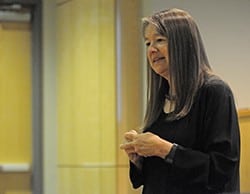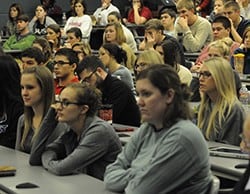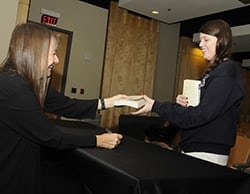Author Speaks on Award-winning Book, Cross-cultural Competency
|  Anne Fadiman speaks to UAMS students, faculty and employees about her book and improving cross-cultural competency in the health professions.
Anne Fadiman speaks to UAMS students, faculty and employees about her book and improving cross-cultural competency in the health professions.
 UAMS College of Pharmacy students listen to Fadiman speak on her book “The Spirit Catches You and You Fall Down.”
UAMS College of Pharmacy students listen to Fadiman speak on her book “The Spirit Catches You and You Fall Down.”
 Fadiman gives a UAMS student a signed copy of her book after her lecture and a question and answer session.
Fadiman gives a UAMS student a signed copy of her book after her lecture and a question and answer session.
Nov. 6, 2013 | Finding common ground with a patient of another culture is a critical skill that may not be emphasized enough in school but is a key tool health care professionals should use, national bestselling author Anne Fadiman told UAMS students and staff.
Fadiman spoke Nov. 4 at a UAMS College of Pharmacy lecture on her award-winning book “The Spirit Catches You and You Fall Down.”
“As pharmacists and other medical doctors, you need to learn about the culture you are dealing with,” Fadiman said. “If you see patients as an ethnic group, you’ll focus only on the differences rather than on the commonalities.”
Winner of the National Book Critics “Circle Award for Nonfiction,” the Los Angeles Times Book Prize for Current Interest, and the Salon Book Award, Fadiman has dealt personally with people of other cultures, in particular a Hmong family who came to the United States as refugees from Laos.
“The Spirit Catches You and You Fall Down” documents and explores the clash between this family and a small county hospital in Merced, Calif. Three-year-old Lia Lee was diagnosed with severe epilepsy, but her parents Foua and Nao Kao Lee, preferred animal sacrifices and herbal remedies as medical treatment for Lia.
Even though the doctors and the Lees wanted what was best for Lia, the lack of understanding between the hospital’s pediatricians, who held to Western medicine, and the Lees, who adhered to rituals and beliefs of their ancestors, led to Lee eventually slipping into a coma and living in a vegetative state for 26 years before dying in 2012 at age 30.
In the book, Fadiman explains that the Hmong culture sees illness and healing as spiritual matters linked to everything in the universe, while the American medical community marks a division between body and soul. Lia’s doctors’ ascribed her seizures to the misfiring of cerebral neurons while her parents called the illness qaug dab peg, meaning “the spirit catches you and you fall down.”
After spending many hours with the Lee family, Fadiman has made it a goal to share what she learned to shed light on the need for physicians to become cross-culturally competent. This may even include allowing patients from other cultures to practice self-treatment or homeopathic medicine.
“As medical professionals we should not discourage self-treatment unless it is harmful to the patient,” she said. “You don’t have to agree with the patient, but you must respect their opinion so they will trust you.”
Fadiman said that there should be more and better interpreters in the medical field, and that pharmacists and doctors should be prepared to ask open-ended questions of their patients.
“You must see the illness from the patient’s point of view by asking them questions like, ‘What do you call this illness?’ or ‘What do you think caused this illness?’”
Fadiman acknowledged that there is not an easy solution to the cross-cultural problem in the American medical system and encouraged students to learn as much as possible about the variety of cultures of potential patients.
Fadiman, the daughter of Annalee Whitmore Jacoby Fadiman, a screenwriter and foreign correspondent, and Clifton Fadiman, an essayist and critic, was born in New York City in 1953. She graduated in 1975 from Harvard College, where she began her writing career as the undergraduate columnist at Harvard Magazine. For many years, she was a writer and columnist for Life, and later an editor-at-large at Civilization. She has won national magazine awards for both reporting (1987) and essays (2003). Fadiman was the editor of the intellectual and cultural quarterly The American Scholar from 1997 to 2004. She now holds the Francis Chair in Nonfiction Writing at Yale. Fadiman lives in western Massachusetts.